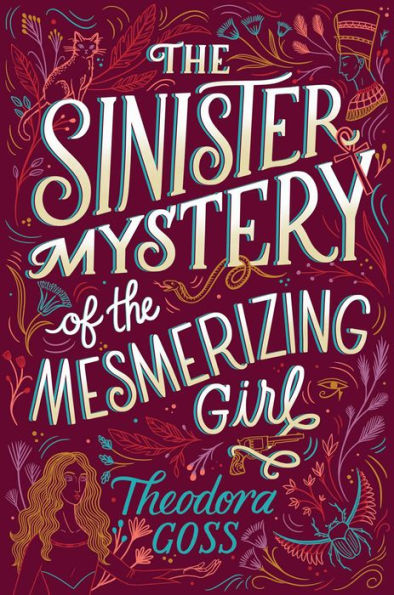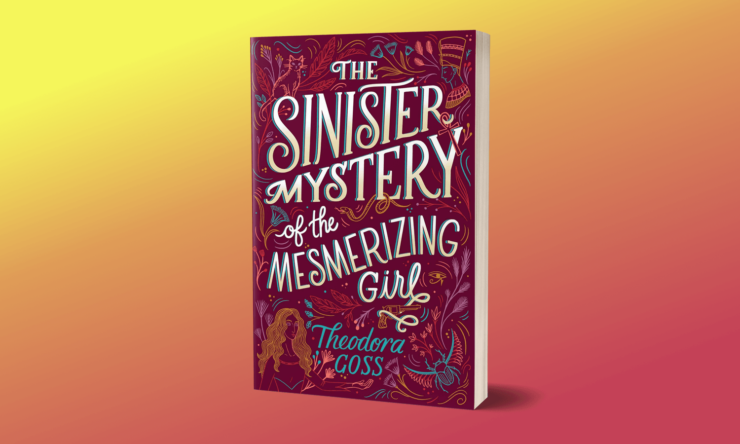Theodora Goss has won both the World Fantasy Award and the Locus Award, and been a finalist for several more. Her initial (and enduring) success has been as a writer of short stories and poetry, with three collections to her name: it’s only in the last three years that she’s begun to publish novels. The Sinister Mystery of the Mesmerizing Girl is her latest, third in the sequence of 19th-century-pulp-inspired volumes that began with 2017’s The Strange Case of the Alchemist’s Daughter and continued in 2018’s European Travel for the Monstrous Gentlewoman.
Previous volumes in the series saw Mary Jekyll, daughter of the infamous Dr. Jekyll, gather around her other young women who had been experimented on by their fathers or father-figures—members, or rogue members, of an organisation known as the Society of Alchemists—Beatrice Rappaccini, the Poisonous Girl; Catherine Moreau, puma-woman and survivor of Moreau’s island of horrors; Justine Frankenstein; and Diana Hyde, Mary’s half-sister, while solving crimes and rescuing other young women (and themselves). In European Travel for the Monstrous Gentlewoman, they rescued Lucinda Van Helsing, who had been turned into a vampire by her father, and made the acquaintance of Mina Murray, Carmilla Countess Karnstein and her lover Laura Jennings, and proceeded to confront the leader of the Society of Alchemists with the need for an ethics committee—among several other, more violent confrontations and a number of kidnappings. At the close of that volume, Mary Jekyll and the other members of her “Athena Club” learned via a telegram from her housekeeper that their housemaid, Alice, another member of the sorority of the experimented-upon, had been kidnapped. The Mystery of the Mesmerizing Girl deals with the consequences of that kidnapping—and the kidnappers’ plan to replace Queen Victoria with a doppelganger and catapult themselves into leadership of the British Empire.
The Mystery of the Mesmerizing Girl is not, it should be noted, the easiest book with which to join the series: it’s less forgiving in this respect than European Travel for the Monstrous Gentlewoman. There are two main narrative strands: one focusing on Alice in captivity, and one focusing on Mary and her search for both the missing Alice and a missing Sherlock Holmes, for whom she has feelings. To a smaller degree, separate narrative strands focus on Beatrice, Justine, and Catherine, as well as Lucinda Van Helsing and Laura Jennings. The cast of characters has expanded significantly since The Strange Case of the Alchemist’s Daughter, making this a much more sprawling narrative than its predecessors, and creating a story that tends to meander rather than gallop.
Buy the Book


The Sinister Mystery of the Mesmerizing Girl
Goss is invested in playing with the tropes of late-19th and early-20th century pulp, and with their characters. (And in playing with narrative: the construction of the novel as a told story, aware of itself as a construct.) Her villains straddle the middle ground between the cliché and the complex: some are caricatured eugenicists (evil to the point of moustache-twirling), but others are wronged—or troubled—people making terrible bargains in order to achieve some amalgam of justice or revenge. Alice, in captivity, comes face to face with the fact that her birth mother is a complicatedly terrible person, one who has, at least understandable reasons for bringing a supremely powerful ancient Egyptian priestess back from the dead in order to take over the British empire. Alice is also somewhere shy of fourteen, so it’s a lot for her to deal with.
The size of the cast means the reader spends less time with each individual character than in previous volumes. While the characters—at least the ones we spend any amount of time with—remain compelling, the number of people who share the limelight means that the overarching plot has to carry the weight of keeping the reader invested in the story. And while it’s got murderous mummies and criminal conspiracies and women rescuing themselves, it turns out that it’s actually the story of a band of plucky heroines saving the British empire. While some characters question whether “saving the British empire” (even from the worst of its elites) is in fact something worth doing, the narrative itself ends up reinforcing the idea of a British empire, headed by the elderly Victoria Regina, as a normative, even positive thing. The romance of empire is a heady thing, but in a novel that successfully interrogates—while playing with—many other tropes of the pulps that it’s re-envisioning for the modern age, the eucatastrophic restoration of the status quo feels a little… off. (Personally, I find it unsatisfying, but then at the moment, it’s very difficult to be Irish and feel even slightly sympathetic to the romance of the British empire.)
On the whole, while I enjoyed reading The Sinister Mystery of the Mesmerizing Girl, and while it’s an entertaining instalment in the series, it’s less well-paced and weaker than its predecessors. Goss doesn’t quite live up to the high standards she’s previously set here.
The Sinister Mystery of the Mesmerizing Girl is available from Saga Press.
Liz Bourke is a cranky queer person who reads books. She holds a Ph.D in Classics from Trinity College, Dublin. Her first book, Sleeping With Monsters, a collection of reviews and criticism, was published in 2017 by Aqueduct Press. It was a finalist for the 2018 Locus Awards and was nominated for a 2018 Hugo Award in Best Related Work. Find her at her blog, where she’s been known to talk about even more books thanks to her Patreon supporters. Or find her at her Twitter. She supports the work of the Irish Refugee Council, the Transgender Equality Network Ireland, and the Abortion Rights Campaign.










